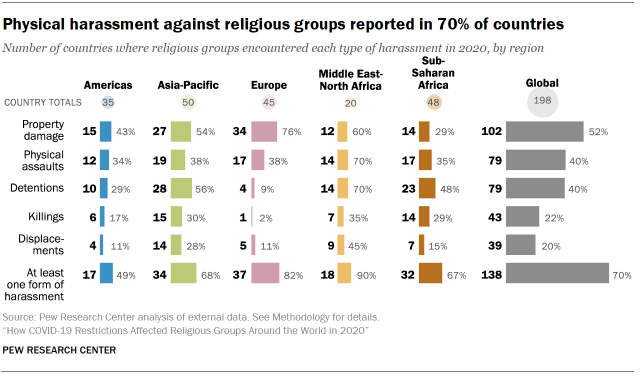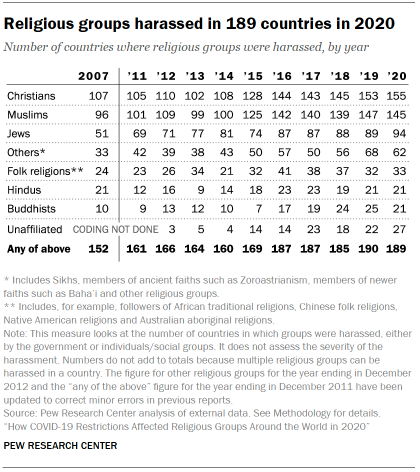Religious groups faced harassment by governments, social groups or individuals in 189 countries and territories in 2020. This was nearly the same as in 2019, when harassment of religious groups was reported in 190 countries and territories – the highest number since this tracking began in 2007. (These counts include all countries in which the sources used for this study report at least one incident of any type of harassment. As such, the overall numbers provide a sense of how widespread harassment is around the world, but they do not speak to its severity.)
The types of harassment against religious groups analyzed in this chapter include acts of force resulting in property damage, assaults, detentions, displacements or killings (all five of which are categorized as “physical harassment”), as well as derogatory statements (categorized as “verbal harassment”).
Harassment against atheists, agnostics, humanists and others who do not identify with a religion is included if the sources indicate they were targeted because of their beliefs.
In 2020, government authorities harassed religious groups in 178 countries, down from 180 countries in 2019. Social groups or private individuals harassed religious groups in 164 countries, a decline from 169 countries the previous year.
To isolate some of the more severe instances of harassment, researchers analyzed cases where religious groups faced five types of physical harassment (i.e., force or violence) by either governments or private individuals and social groups. Overall, religious groups experienced at least one type of physical harassment in 138 countries (70% of the 198 studied) in 2020, according to the sources used in the study.
Social groups or private individuals used force against religious groups in 105 countries (53%), a decline from 117 countries (59%) the previous year, while governments used force against religious groups in 100 countries (51%), a slight uptick from 96 countries (48%) in 2019.

Damage to property of religious groups (or property damage motivated by religious bias) took place in 102 countries (52%), more than any other type of physical harassment. Social groups or individuals were responsible for religion-related property damage in 81 countries, and governments were responsible in 56 countries.
Europe had the highest share of countries (76% of the 45 countries studied) with religion-related property damage in 2020, more than any other region in the study. In Russia, for example, Jehovah’s Witnesses reported that more than 400 of their members’ homes were raided in 2020, continuing a pattern from previous years. According to Jehovah’s Witnesses in the country, authorities verbally and physically abused members, held individuals at gunpoint, and seized personal belongings and religious materials. In Hungary, vandals damaged several gravestones in two different Jewish cemeteries; similar incidents occurred at Jewish cemeteries in other countries, including Finland, Germany, Moldova, the Netherlands and Russia.
In the Middle East-North Africa region, 12 of the region’s 20 countries reported religion-related property damage. In Syria, which has been embroiled in a civil war since 2011, human rights groups and community representatives reported that Turkish-backed Syrian armed opposition groups looted Yazidi-owned properties and destroyed multiple Yazidi shrines and graves. Meanwhile, in Saudi Arabia, where Sunni Muslims are the majority, authorities bulldozed Shiite graves and raided a Shiite neighborhood to prevent their call to prayer.
Religious groups faced assaults in 79 countries (40% of those in the study) in 2020. Private citizens or social groups carried out such attacks in 58 countries, while governments did so in 37 countries. The Middle East-North Africa region had the largest share of countries with such incidents (70%).
In Lebanon, for example, clashes broke out multiple times between Sunnis and Shiites, and also among Shiite groups, over the hanging of banners for the Shiite commemoration of Ashura, in one instance resulting in several injuries and three deaths. And in Israel, tensions rose during the year around the holy site known to Jews as the Temple Mount and to Muslims as Haram al-Sharif, where police arrested six Muslim worshippers in January for “shouting nationalist rhetoric” and were shown on video kicking one of those arrested, according to the U.S. State Department.
Meanwhile, 19 out of 50 countries studied in the Asia-Pacific region and 17 out of 45 countries in Europe (38% for both regions) had instances of religious groups being physically assaulted by government authorities.
Detentions related to religion – including arrests, abductions and other types of imprisonment that were reported as having been conducted arbitrarily or without due process – occurred in 79 countries and territories out of the 198 analyzed (40%). In 2020, authorities in many countries detained members of religious groups for violating COVID-19 public health protocols, which were included in this count. (See Methodology for more details.)
It was much more common for governments to detain members of religious groups (76 countries) than for social groups – including private militias and other organizations – to do so (19 countries). For example, of the countries studied in the Asia-Pacific region, there were 27 countries (54%) where governments detained members of religious groups, compared with six countries (12%) where nongovernmental actors were reported as responsible for detentions. Governments detained members of religious groups in almost half the 48 countries analyzed in sub-Saharan Africa (48%) and in a majority of countries studied in the Middle East-North Africa region (70%).
In some cases, governments detained individuals for insulting a religion. For example, in the Maldives, authorities investigated a man for “criticizing Islam” and sentenced him to a year in prison for “obstructing justice.” And in Bangladesh, a Hindu man who was imprisoned in October 2019 for posting anti-Islam messages on social media remained in detention in 2020.
Religion-related killings (which include capital punishment, extrajudicial killings and deaths resulting from torture or other physical injuries) took place in 43 countries (22%), with governments reported as perpetrators in 16 of them and private individuals or groups carrying them out in 35 countries. The Middle East-North Africa region had seven countries (35% of those in the region) where religion was a motivating factor for killings, while the Asia-Pacific region had 15 such countries (30%) and sub-Saharan Africa had 14 (29%). For example, in Shiite-majority Iran, international human rights organizations said the government charged and executed political dissidents – who were disproportionately Sunni Muslims – with “enmity against God.” Meanwhile, in Ethiopia – where an internet shutdown in 2020 prevented reliable information from getting out – a series of attacks were reported in the Christian holy city of Axum. In one case, international media and human rights organizations said Eritrean forces fighting alongside Ethiopian troops opened fire on worshippers celebrating Mass at Maryam Dengelat Church and killed dozens of worshippers.
Displacements of religious individuals or groups occurred in fewer countries than the other types of physical harassment analyzed in 2020 (39 countries, 20% of the total). This category includes people being deported, driven from their homes or forced to flee their country through coercive means. Governments caused displacement for religion-related reasons in 30 countries, while social groups and individuals were responsible in 16 countries. There were 14 countries in the Asia-Pacific region (28%) that had religion-related displacements, and the Middle East-North Africa region had nine countries where this happened (45%). In Sri Lanka, for example, media reported that an archeological task force (made up of Sinhalese Buddhists and created by the country’s president to preserve its “religious heritage”) evicted about 400 Muslim residents from their land. And in Laos, seven Christian villagers in Salavan province reportedly were forced out of their homes for refusing to give up their faith.
In some countries, minority religious groups may face all five of these forms of physical violence, either from governments or from private citizens. For instance, in Myanmar, also called Burma, the military has been accused of attempting to “exterminate” the minority Rohingya Muslim population through “killings, mass rape, and other sexual violence; disappearances; forced starvation; arbitrary detentions and arrests; and looting, burning, and property confiscations,” according to the U.S. Commission on International Religious Freedom (USCIRF). The United Nations reported that at least 500 civilians were killed in clashes in 2020 between Myanmar’s military and an ethnic armed group called the Arakan Army. Most of those killed were Rohingya Muslims, and some were Christians, according to USCIRF. The military’s operations against a Muslim-majority township in Rakhine state also displaced thousands of civilians during the year.
Which religious groups were harassed?

Christians and Muslims, the largest religious groups in the world, were harassed in more countries than any other religious groups analyzed, which was also true in previous years of the study. In 2020, Christians were harassed in 155 countries, up from 153 in 2019, and Muslims were harassed in 145 countries, a decrease from 147.
As in previous years, Jews also faced harassment in more countries than any other religious group besides Christians and Muslims, even though Jews make up just 0.2% of the world’s population. In 2020, Jews were harassed in 94 countries, up from 89 in 2019. The year 2020 also saw an increase in the number of countries where religiously unaffiliated people (including atheists and agnostics) faced harassment – 27, up from 22 in 2019.
Several religious groups, including Muslims and Buddhists, and other smaller groups not analyzed individually (an umbrella category that includes Baha’is, Scientologists, Sikhs, Rastafarians and Zoroastrians, among others) faced harassment in fewer countries in 2020 than in 2019. Meanwhile, Hindus faced harassment in the same number of countries (21) as in 2019, while adherents of folk religions faced harassment in 33 countries, a small uptick from 32 countries the previous year.
As in past years, most of the religious groups analyzed in the study were harassed in more countries by governments than by private individuals or groups. Jews were the only religious group that faced government and social harassment in the same number of countries (73) in 2020.


